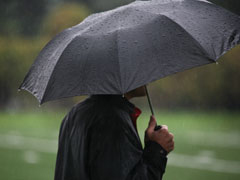Medical School Admission Affected by Weather: Study

Are health care professionals vulnerable to temporary changes in mood related to rain, sleet, snow, and other adverse weather conditions? Ultimately, interview scores were found to be significantly lower on rainy days.
"We all know that mood changes people's behaviour in diverse settings, from financial markets to romantic situations. This is the first time such factors have been shown to influence important decisions in medical care." says Dr. Donald Redelmeier, staff physician and director of Clinical Epidemiology at Sunnybrook Health Sciences Centre.
"We wanted to examine how mood can change decision making in health care and how it can potentially sway admissions to the University of Toronto Medical School, perhaps one of the most prestigious and impressive in North America," says Dr. Redelmeier, also a professor of Medicine at the University of Toronto (U of T). "We tested whether health care professionals are vulnerable to temporary changes in mood related to rain, sleet, snow, and other adverse weather conditions."
Published today in Canadian Medical Association Journal (CMAJ), the study included all applicants to the University of Toronto medical school for the last six years, examining both interview scores and prevailing weather on the day of interview. Overall, this amounted to 2,926 interviews, of which about two thirds took place on sunny days and one third on rainy days. Each interview lasted about 30 minutes, involved multiple questions related to a medical career, and ended with the candidate receiving a confidential score.
The study found that the background characteristics for all candidates were generally outstanding. In addition, these characteristics were no different from those interviewed on sunny days compared to rainy days. However, interview scores were significantly lower on rainy days. The difference amounted to about an average one per cent decrease in score, which is about as important as a 10 per cent difference in formal Medical College Admission Test (MCAT) scores. This difference was equally large for senior interviewers and junior interviewers, and equally large for stronger and weaker candidates.
"This difference seems small," says Dr. Redelmeier. "Yet it can make all the difference in the world since about one hundred candidates each year cluster within one percent of the admission cut off. For some individuals, this small difference can change a person's life." Dr. Redelmeier suggests that people be more aware of the effects of mood on all decisions. Calling attention to the rain, for example, makes people more aware of its presence and can attenuate its hidden influence on judgment.
The study was funded by the Canada Research Chair in Medical Decision Sciences.
PDF / View full media release »





